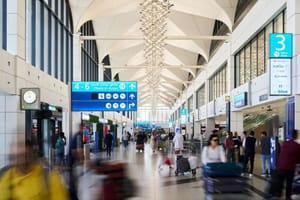Saudi Arabia's civil aviation authorities have begun to enforce a decision that eliminates visa stickers for travelers arriving from 12 specific countries. The implementation is taking place gradually, as per a scheduled timetable.
The General Authority of Civil Aviation (GACA) has issued a circular to all airlines, approving the removal of visa stickers for labor, visit, and residency visas issued by Saudi diplomatic missions in certain countries.
The list of countries now includes Pakistan, Yemen, Sudan, Uganda, Lebanon, Nepal, Turkey, Sri Lanka, Kenya, Morocco, Thailand, and Vietnam.
The visa sticker has been substituted with a printed e-visa that contains the traveler's information, and its validity is authenticated through a Quick Response (QR) code.
The gradual implementation of this replacement decision for the 12 countries is outlined in the timetable, with specific dates set as follows:
- Pakistan starting from July 24th
- Yemen on July 26th
- Sudan on August 2nd
- Uganda on August 7th
- Lebanon on August 9th
- Nepal on August 14th
- Turkey on August 16th
- Sri Lanka on August 21st
- Kenya on August 23rd
- Morocco on August 28th
- Thailand on August 30th
- Vietnam on September 4th
The General Authority of Civil Aviation (GACA) clarified that visa stickers issued before those dates remain valid.
In May, the Saudi Foreign Ministry introduced a new initiative, enabling the issuance of e-visas at select missions of the kingdom abroad. This initiative involves substituting the traditional visa sticker on the passport with an electronic visa, and the relevant data can be accessed using a QR code. The change is in line with the ministry's efforts to automate procedures and enhance consular services for granting work, residency, and visit visas, as reported by the Saudi news agency SPA during that period.
During its initial phase, the process was put into effect at the Saudi missions in the UAE, Jordan, Egypt, Bangladesh, India, Indonesia, and the Philippines. Saudi Arabia houses a significant migrant worker population.
The nation's objective is to broaden its economy, reduce reliance on oil, and entice a larger number of international travelers.
According to Tourism Minister Ahmed Al Khateeb's statement in March, the number of visitors to Saudi Arabia increased from 2.4 million in January to 2.5 million in February. With ambitious plans, the kingdom is targeting to welcome 25 million foreign tourists this year.









